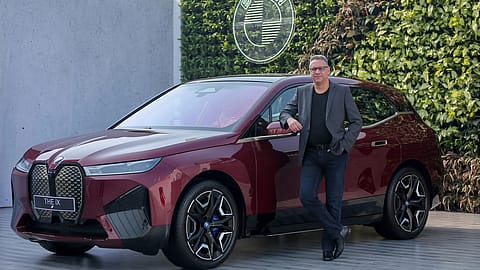BMW, Mercedes, Volvo unfazed by Tesla’s India entry
BMW, Mercedes-Benz and Volvo say their well-established network gives them an edge over Tesla's limited presence.

Tesla’s long-awaited entry into the Indian market with showrooms in Mumbai and Delhi is being seen as too little too late by German luxury carmakers, Mercedes-Benz and BMW. In India, Elon Musk-led Tesla will also compete with Chinese EV giant BYD, Swedish carmaker Volvo, and South Korean automaker Kia.
BMW currently leads the luxury electric segment in India, with EVs accounting for 18% of its total sales. With six electric models, its electric portfolio is the widest in the country.
“Our supremacy in luxury EVs is sustainable. Our EVs are not compromised in any way,” says Vikram Pawah, President & CEO, BMW Group India. “People want a car as a statement. People don’t want a car only as software-on-wheels. A car is an emotive thing. Those things matter. We are confident of maintaining our lead in EVs. It’s not just launching a product. It’s the complete ecosystem we created for it,” he says.
BMW’s top-selling EV in India, the BMW iX1 Long Wheelbase, can always be made more aerodynamic for efficiency, but then it won’t look like an SUV (sport-utility vehicle), Pawah adds. The iX1 Long Wheelbase is priced at ₹50 lakh (ex-showroom). BMW India sold 1,253 EVs from January to June 2025, as per VAHAN data.
Tesla’s only vehicle on sale in India is the electric compact crossover SUV Model Y, priced at ₹59.89 lakh (ex-showroom).
Santosh Iyer, the managing director and CEO of Mercedes-Benz India, the country’s top luxury carmaker, says it’s too late for Tesla to come to India now. “The novelty factor is no longer what it used to be 3-4 years ago. We would like to wait and watch. What I am more curious about is to see whether consumers will accept a model where there are no dealers and one or two workshops in India,” says Iyer. "India is a large geography. If the car is having an issue in Dehradun, will they bring it to Delhi? What happens then?” Iyer asks.
To be clear, Tesla has yet to appoint a country head for India. Its operations are currently being run remotely by Asia-Pacific executives.
Recommended Stories
“Some of the two-wheeler players did this with no franchise model. They were not that successful. Now we have to see how Tesla manages that in India,” says Iyer.
Iyer, however, adds that it’s always good to have a global EV player in India. “It helps in driving sensitiveness and awareness about EVs.”
On the impact of Tesla on Mercedes-Benz India's business, Iyer says that the German carmaker’s entry-luxury business, ICE as well as EVs, put together, is 8-10%. “So, the maximum impact it can have is on that 10% only. Our customers may buy a Tesla as one of the cars in their household, but that’s not going to cannibalise my current cars,” he states. “I think we are much more secure compared to other players in the entry segment with a bigger stake. It may have some impact, but only time will tell,” says Iyer.
Mercedes-Benz EQA, the luxury carmaker's least-expensive electric offering in India, comes with a price tag of ₹66 lakh (ex-showroom). However, a majority of Mercedes’ EV sales come from models priced over ₹1 crore. Mercedes-Benz sold 639 EVs in the first six months of 2025.
(INR CR)
Chinese carmaker BYD, too, isn’t worried about Tesla’s India foray. “The more the merrier. Tesla is a globally recognised company. We welcome their entry. I don’t think we need to really take on Tesla. If we do our work in terms of giving value to customers through our battery, safety, design, technology and range, I think the job will be done,” says Rajeev Chauhan, head of Electric Passenger Vehicles (EPV) Business at BYD India. BYD’s top-selling premium EV, the Sealion 7, is priced starting from ₹49 lakh (ex-showroom).
Chinese-owned Swedish automaker Volvo is counting on its heritage Scandinavian roots that differentiate it from new-age companies like Tesla. Volvo is much better placed than anybody else due to its strong network in India, says Jyoti Malhotra, managing director of Volvo Car India. "India is a big country. Competition will come. Everybody is welcome. But we need to strengthen our own offerings,” he says. Volvo sells two electric vehicles in India, the EX40 and the EC40, priced from ₹50.10 lakh and ₹59 lakh, respectively. It is expected to launch its smallest electric SUV, the Volvo EX30, during the festive season this year. Volvo sold a little over 205 electric cars in the first six months of 2025.